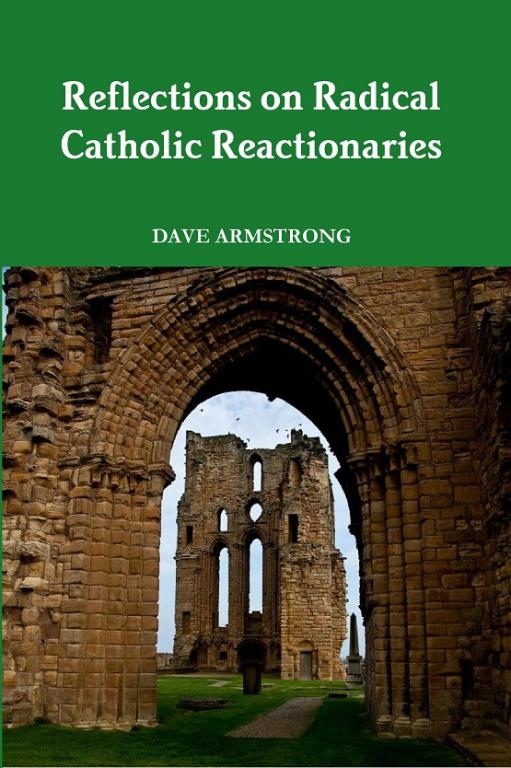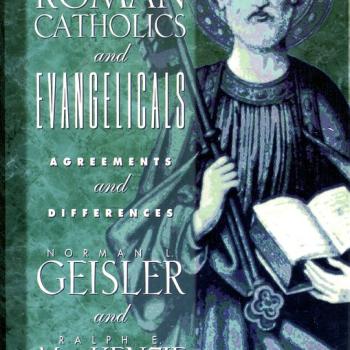
This is a somewhat abridged version of chapter 2 of my 2002 book, Reflections on Radical Catholic Reactionaries [purchase at the link for as little as $2.99]
*****
- The orthodox, faithful, obedient Catholic outlook on the Church (even in the truly grave crisis it now endures — arguably the greatest ever) is far more sunny than that of radical Catholic reactionaries. Their incessant pessimism and cynicism often runs contrary to a robust faith and trust in God, and a working knowledge of past crises.
- The Catholic Church has not caved into modernism and immorality, as so many other Christian groups have done. We have resisted, with God’s supernatural help. The most recent battle for the Church is already over. Have reactionaries missed it? The liberal / modernist / dissident / “progressives” have lost, and they know it full well. If only reactionaries could realize this fact. We are like Europe after World War II. It would still take a while to rebuild, but it was inevitable, and the nightmare was over.
- In 1990, I was amazed at the preservation — in the Catholic Church alone — of the traditional morality that I had increasingly come to espouse as an evangelical Protestant missionary and pro-life activist. I viewed it as the very last bastion against modernism and the secular humanist onslaught, and the glorious fullness of apostolic Christianity. I was, therefore, compelled to join such a wonderful Church, the Church, and was delighted to discover that it actually existed (I had had the usual invisible church conception of evangelicalism, but I was far less a-historical than most). And now reactionaries come around and tell me that all this was an illusion. Nonsense! The beliefs have not changed! We call this development. Obviously, we are operating from two completely polarized views of reality, when it comes to the Church. Someone must be wrong.
- Clearly, the Church has (institutionally) resisted the tides of secularization. There have been many individual casualties, sadly, as always with these huge, momentous spiritual/cultural battles. Priests, bishops, nuns and monks, heretical lay activists, DRE’s (even popes) may indeed have to give account to God for their actions or inactions. But whatever the case may be, the dogmas and structure of the Church have survived intact.
- I believe we shall see a huge revival (perhaps the largest ever) in this century, which I will witness when I am an old man, some 20-30 years from now. We’ve seen every abomination and form of wickedness imaginable in the 20th century. This is the age of martyrs, even more so than the early centuries. That blood is not shed in vain (redemptive suffering). History shows us that — generally — the centuries following terrible ones are times of revival, reform, and rejuvenation in the Church. Revival is cyclical, and recurring. It has always been this way.
- One can see the wave of the future if they look closely enough. It will be a slow resuscitation (we’re talking in terms of centuries and ages), but it’s inevitable if the Lord doesn’t return soon, if for no other reason than the fact of God’s amazing mercy, and His Providence, whereby we know that “all things work together for good, for those who love God, who are called according to his purpose” (Romans 8:28). Therefore, we ought to always be optimistic and joyful, in love with God and His Church, the Holy Father, the Virgin Mary and the saints.
- Do reactionaries have their heads in the sand? Like the Pharisees of old (the legalists and hyper-reactionaries of that time), they fail to discern the “signs of the times” (Matthew 16:3). They will tell us how many liberals and heterodox Catholics are still around, and point to the scorched earth left in their wake. Well, so what? There were many liberals around during the Catholic Reformation and the Council of Trent, too. It so happened that most of them had left the Church, rather than remain in it (though, of course, many liberals are leaving the Church today). They were called Protestants. There were liberals during the Councils of Nicea (Arians), and Ephesus (Nestorians), and Chalcedon (Monophysites), and Vatican I (Old Catholics).
- Times of great revival and reform can occur even while heterodox liberals and heretics remain a problem. God is not bound by our timetables, desperation and alarmism, limited perceptions, and conceptions of things. He simply ignores the liberals and goes about His business. They are merely pawns in His Grand Scheme, just as the Egyptians or Assyrians or Babylonians or Persians or Greeks or Romans or Nazis or Soviet Communists were (all immensely powerful in their heyday). They are not in the middle of the Divine Plan, as we orthodox Catholics are, because they do not seek to do His will. They have rebelled, and are therefore, “out of the picture.” That is why they are already irrelevant, and destined for obsolescence in the dustbin of history, like all other heresies and schismatic sects (where, for example, are the Marcionites or Albigensians these days?).
- The only Christians — besides Catholics — with any staying-power historically, and semblance of apostolic orthodoxy, are the Orthodox — precisely because they maintained apostolic succession and have valid sacraments. Apart from that, Christian or quasi-christian sects eventually go liberal (mainline Protestants) or disappear. It takes many decades or centuries, but it happens. They have life in them only insofar as they approximate, or draw from, the Catholic Church. Liberalism, too, will disappear as any sort of major influence, because it has no life in itself. It can’t reproduce itself because it is the counsel of despair and disbelief. The very next generation will largely reject it. These things are absolutely certain, and are seen in decreasing membership rolls of “mainline” denominations. The demise (the real “auto-demolition”) may take a while yet, but it will occur, because God is not mocked.
- Complaints, undue criticism, condemnation, disobedience, dissent, bickering, moaning and groaning, silly and self-important pontifications, whining, waxing eloquently cynical: that’s what we so often see in the radical Catholic reactionary movement. It’s extremely unseemly, unedifying, and unappealing.
- It is denied that the reactionary position is characterized by an attitude of pessimism and lack of faith. “Out of the abundance of the heart the mouth speaks” (Matthew 12:34). One reads the sort of comments reactionaries habitually make, and one is more than justified in arriving at certain conclusions, if words mean anything at all. If individual proponents of these viewpoints happen to have a joyful heart, then they would do well to include some positive remarks in public also. How about an article once in a while like “What’s Good in the Church?”? A gloomy “quasi-defectibility” outlook is contrary to a truly Catholic faith in God’s guidance of His Church. Many reactionary writings do not convey this sort of hope and sunny optimism at all.
- The important thing among these “true believers” is for them to know what they are against. That is sufficient for inclusion into the club. “My enemy’s enemy is my friend.” The same dynamic also applies to anti-Catholics in all their various nefarious manifestations. Some fundamentalists are even willing to absurdly embrace the Albigensian Gnostics, in the attempt to claim a pedigree apart from the Catholic lineage.
- The alarmist reactionary rhetoric gets worse and worse, as with all conspiratorial schemes and theories trumped-up in order to explain things that people find themselves unable to comprehend or understand (therefore, they disobey and lose confidence in their ecclesiastical superiors). Like Job’s comforters, reactionaries fail to see that God is at work: though mysterious and inexplicable His ways may continue to be. A little reading of Church history (the bleak periods) might do wonders. Catholics take the long view of history; they are not bound up by the fads and peculiarities and zeitgeist of any particular time period. This is one of the glories of the Church; one of the things that so attracts converts to it.
- A certain harmful and deleterious “spirit of reactionaryism” runs contrary to the spirit of obedience to the pope and Church authority, and to a bright, optimistic, hopeful faith (which martyrs possess in the very worst of circumstances). The doom-and-gloom mentality, exclusivistic orientation, and tendency to resort to conspiratorial explanations for things one is unable to comprehend also typifies certain strains of political conservatism, and “fundamentalist” branches of Orthodoxy and Protestantism.
- Were all converts like myself dupes who should have stayed in the “conservative” denominations? I’m here in the Church because it taught against contraception, like all Christians did before 1930. The fact that many Catholics disbelieve the teaching was absolutely irrelevant with regard to my decision to convert. The doctrine was correct. The same applies to divorce and abortion. This is what attracted me to the Church, because moral laxity can be found anywhere (original sin). But true, traditional, unchanging Christian moral teaching is only found in its fullness in one place. That’s what I had been seeking for, for ten years as a serious Christian. I found it, and here I am, and quite glad to be here, and not at all constantly “troubled” like so many reactionaries seem to perpetually be. It must get very tiring. Converts have found the pearl of great price. Reactionaries seem to want to prove that the pearl is really a jagged, stinky lump of coal, or worse.
- Converts know that there are problems of [theological] liberalism in the Church. It doesn’t take a rocket scientist to figure that out. Liberals (like the poor) will always be with us. But only one Church has true doctrine in toto, true moral teaching, the most sublime spirituality, saints and miracles and all the rest, and the unbroken history to verify those. That is what brings converts in, because we are well acquainted with the doctrinal chaos and ecclesiological anarchy in Protestantism.
- Faith and perseverance must enter in, in such troubled times in the Church. We need to understand that Church history repeatedly shows this pattern; that even the early Church had tremendous scandal and hypocrisy, and — above all — that the Church is indefectible. That’s why the orthodox Catholic remains forever an optimist. We readily acknowledge that modernism is rampant; we deny that it can ever overthrow the Church. One must have faith. Reactionaries ought to read the book of Job. Tough times afflict the Church as well as the individual. It is to be expected. Why does that surprise reactionaries? Liberalism, heterodoxy, and unbelief are never surprising, but a Church that remains orthodox despite all is perpetually a delightful and heartening “surprise.” The glory of the Church (like that of the saints) is not that it has no problems, but that it always sees a way through the problems. It always conquers them. Heresy has no life of its own, so it always fails eventually, while the Church marches on (as in Chesterton’s marvelous reflections on “orthodoxy”). It does so because it is God’s own Church, and God cannot fail.
- The Church has always had problems. The Catholic must take a long view of history. Modernism will not be defeated in a day. But it will be defeated, and we see more and more signs of that every day.
- The liberal is ignorant of Church history, and re-makes the Church in his own image. Protestants often take precious little interest in Church history at all. Reactionaries forget (or never knew) that the Church has been through very dark periods on many occasions.
- Reactionaryism is profoundly pessimistic, which is fitting for Buddhists, Hindus, or nihilists, but not Christians. So God has given up on His Church? Even our Lord Jesus had His Judas, and St. Paul had his Corinthian church. God saw fit to include in the ancestry of Jesus a harlot (Rahab) and a murderer and adulterer (David). There was no “golden era,” if by that one means a period without serious ecclesiastical problems. I think reactionaries continue to believe in original sin, and the world, the flesh, and the devil. The Church is to be reborn in the caves and backwaters of Pharisaical reactionary gatherings? I think not. The verdict of Church history lies with the institutional Church, and most assuredly against the quasi-schismatic tendency that characterizes reactionary thought and opinions.
- The liberals are dying out. We ought to just forget about them, just like Merlin did to Queen Mab in the Arthurian legend. They will be irrelevant in due course, just like the buffoons of the so-called “Enlightenment” and French Revolution and the Communists and Nazis are today. If God mocks the fools and despots of the world, how much more so in the Church? Modernism will go the way of all heresies.
- It always takes a bit of faith and foresight to recognize the beginnings of a revival when it is occurring. That’s nothing new. So reactionaries can’t see it, because they are concentrating on all the bad things and problems that are in the Church. Problems of one sort or another have always been present; obviously they didn’t prevent past revivals from occurring.
- What we have seen is that the Catholic Church has heroically and magnificently upheld traditional doctrine and morals, while virtually every other Christian group has caved in, to one degree or another. This is a major reason why I am a Catholic today. The stand on contraception was the first thing that started me on the road to conversion, because I desired the moral theology of the early Church and the apostles, and looked around to see who had preserved it in its totality.
- The Orthodox may not have a “modernist crisis” as we do (in a certain liturgical or “surface” sense), but the reason for that is (arguably) because they didn’t have the cultural and theological foresight (nor even the ability, without councils and central authority) to confront modernism head on and defeat it. Consequently, they are compromising on contraception, whereas we have stayed true to the universal Christian prohibition of contraception prior to 1930. Protestants (even evangelicals) are caving in and compromising doctrinally and morally all over the place (the Anglicans provide a clear, quick example of that). We have, of course, many individuals who are compromising and selectively believing, but Church doctrine has remained inviolate, and that was the promise of Jesus to Peter, not that every believing Catholic would be fully orthodox and observant (which has never happened and never will). When one faces a great evil and a powerful opponent (as in any military conflict), one takes some casualties, and there is much hardship, but in the long run, it is a better thing to do than to hide from reality or pretend that no problems exist, and engage in a pipe-dream that cultural isolationism will suffice to overcome them.
- Things take time. The pessimist always concentrates on present miseries, while the optimist, idealist, or person exercising faith look at the good things that will come in the future, as the present decadent cycle comes to a close and the new revival starts to gradually pick up momentum. We need only look back at Church history to see what is coming next (excepting Christ’s return, of course). If the Second Coming isn’t imminent, then it is almost certain that major revival will come in this century.
- The indefectibility of the Catholic Church and its divine protection from the Holy Spirit is our grounds (in faith) that things will get better, and are, in fact, not as bad as they seem in the first place (at the deepest, spiritual level). Joy rests on grounds other than circumstances. Joy comes from inner peace of the soul, by the grace of God, and a Christian can possess it even in a concentration camp, or with incurable cancer. The saints even truly embraced suffering with joy, as a privilege and honor and a way to help save souls. I am referring to the optimism of the eye of faith: the assurance that God knows what He is doing, and that history has a purpose: that all things are in His Providence, though He obviously doesn’t will all things in His perfect will. He allows bad things, and then uses them for His own purposes. The modernist crisis is no different than anything else; God uses it for His benevolent ends, and is not mocked. Doom-and-gloom and Chicken Little pessimism are contrary to faith and the true Catholic spirit.
- I suspect that a lot of the reactionary analysis of the crisis in the Church comes down to temperament. Some people are of a state of mind and emotional make-up that they are naturally pessimists. They may struggle with depression or find it difficult to be of good cheer, with regard to day-to-day life. They might be going through any number of things that are legitimately troubling. Sensitive souls will be harmed and troubled more by evil and “things gone wrong” than less sensitive types. We mustn’t pretend that temperaments and personality types have no effect on our worldviews. They certainly do. Nevertheless, I think there are real, objectively measured grounds for optimism with regard to the Church situation, other than simply a feel-good delusion based on mere temperamental factors and circumstances.
- If we were to talk to someone in the dark cultural days of the collapse of the Roman Empire, we could tell them (with our perfect hindsight), that God would build up a new and better civilization, which indeed happened (Christian Western Civilization), and that our citizenship is ultimately not of this world in the first place (as St. Augustine argued in his classic, City of God). Jesus said the same thing: “My kingdom is not of this world.” It’s not that these things pose no problem or inner conflict at all (I’m very troubled about the descent of America into a moral sewer and sound-asleep intellectual stupor), but that the Christian has a frame of reference that transcends them and offers ultimate hope. We are to work within our cultures to do what we can to transform and “baptize” them. That was the aim of Vatican II, but reactionaries ignore that by looking at historical events after it, rather than the content in it.
- My basis for thinking that the 21st century will bring revival, is seeing right now many good, real, and significant signs, and the fact that the 20th century was the absolute worst in history (at least in terms of murder and other sorts of human suffering due to despotism). Among many of those who died were Christian martyrs: more than at any other time, even in the early Church, and that is important to consider because “the blood of martyrs is the seed of the Church.” Their suffering will not have been in vain. When Christians suffer, it is for redeeming purposes. So I believe that all this suffering will bear fruit in a revival that we already see the beginnings of. God’s mercy is such that He will pour out more graces after such a brutal century. Many Marian apparitions (approved ones) proclaim this same message as well.
- We’re in a bleak period, having taken the brunt of liberal nonsense and heterodoxy (teetering and dazed, but still afloat and very much alive). There have been many such periods. There were popes who went whoring around; there were horrible massacres in the Crusades, which we are still trying to live down. There was astonishing ignorance. The worst periods were always followed by glorious periods. The 10th century was followed by St. Dominic and St. Francis of Assisi and St. Thomas Aquinas and St. Catherine. The Borgia Renaissance popes and numerous clerical abuses of that time (partially leading to the Protestant Revolt) were followed by St. Robert Bellarmine, St. Ignatius Loyola, St. Francis de Sales, St. Teresa of Avila, and the glorious Catholic Reformation. I submit that reactionaries have a pronounced lack of understanding as to precedents for this sort of thing and how God brought His Church out of them, every time, without exception. Invariably, the best centuries follow the worst. So if that model holds, what is likely to happen in the 21st century? Have reactionaries learned nothing from previous Catholic history (or are they just unaware of it, prior to their own lifetime, as so many are)? It’s human nature to think that our own period is the worst ever (not to deny that, indeed, very terrible and troubling things have happened in our age).
- One reactionary with whom I was dialoguing believed that the Catholic Church “may not recover for a thousand years, or ten thousand” (from the crisis of modernism). This person (and anyone else who believes the same) lacks faith in God and His promises, and can’t see any of the good things that are right in front of him. Somehow reactionaries believe that this crisis will take 10,000 years rather than a hundred or two to resolve. Even the liberals aren’t that confident about their supposed “victory.” Quite the contrary! There is no question that this mentality is full of the bleakness of utter despair for the Church, and lacking much of a sense that God is in control. Why be a Catholic at all, with such a low view of the Church? I don’t get it. I would never have converted if I believed this. There would be no reason to. So the reactionary view turns out to be “counter-conversion” (just as the liberals offer no reason to convert to the Church — they don’t urge it at all). If there were no hope for any earthly church then I would have stayed in my little self-chosen denomination, believing that one is just as good as another.
- The belief that God can guide even a human institution that is at the same time “His” in a special way takes more faith than believing that He can produce an inerrant, inspired Scripture through sinful men, but we believe it because we believe in the Word made Flesh. In other words, God can transform even the human into something glorious. It all flows from the incarnation.
- We mustn’t condemn all “change” per se, without examining the merits and demerits of each change. It strikes me as simply a knee-jerk reactionary impulse: “change is bad.” What about “changes” like the Catechism and the wave of converts and the flourishing of apologetics, or the significant rise in vocations in various quarters, or the strong trend of orthodoxy of young seminarians? Do reactionaries like those changes, or must they always see only the negative (much of which is arguably not even “negative” in the first place)?
- Reactionary lamentations about the state of the Church are scandalous and highly imprudent. Even if some few of their analyses are correct, it is not right to air dirty laundry in public, just as it is highly inappropriate for a married couple to loudly argue about their personal problems in a public restaurant.
- The fabulous joy, hope, and overwhelming feeling of “coming home” which I — along with many converts — have experienced upon entering the Catholic Church, could not last a day if I were to adopt the pessimistic, “o woe is me” views that reactionaries manage to hold.
***
For many more articles on this topic, see my Radical Catholic Reactionaries vs. Catholic Traditionalism web page.
***
Unfortunately, Money Trees Do Not Exist: If you have been aided in any way by my work, or think it is valuable and worthwhile, please strongly consider financially supporting it (even $10 / month — a mere 33 cents a day — would be very helpful). I have been a full-time Catholic apologist since Dec. 2001, and have been writing Christian apologetics since 1981 (see my Resume). My work has been proven (by God’s grace alone) to be fruitful, in terms of changing lives (see the tangible evidences from unsolicited “testimonies”). I have to pay my bills like all of you: and have a (homeschooling) wife and two children still at home to provide for, and a mortgage to pay.
*
My book royalties from three bestsellers in the field (published in 2003-2007) have been decreasing, as has my overall income, making it increasingly difficult to make ends meet. I provide over 2700 free articles here, for the purpose of your edification and education, and have written 50 books. It’ll literally be a struggle to survive financially until Dec. 2020, when both my wife and I will be receiving Social Security. If you cannot contribute, I ask for your prayers (and “likes” and links and shares). Thanks!
*
See my information on how to donate (including 100% tax-deductible donations). It’s very simple to contribute to my apostolate via PayPal, if a tax deduction is not needed (my “business name” there is called “Catholic Used Book Service,” from my old bookselling days 17 or so years ago, but send to my email: [email protected]). Another easy way to send and receive money (with a bank account or a mobile phone) is through Zelle. Again, just send to my e-mail address. May God abundantly bless you.
*
***












